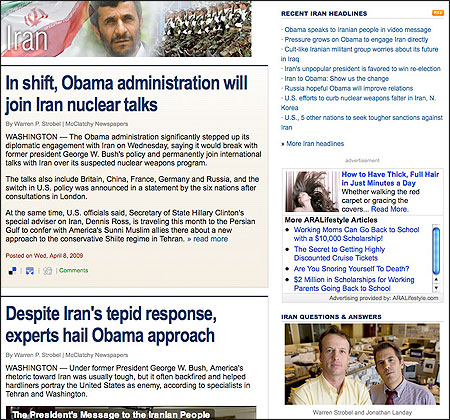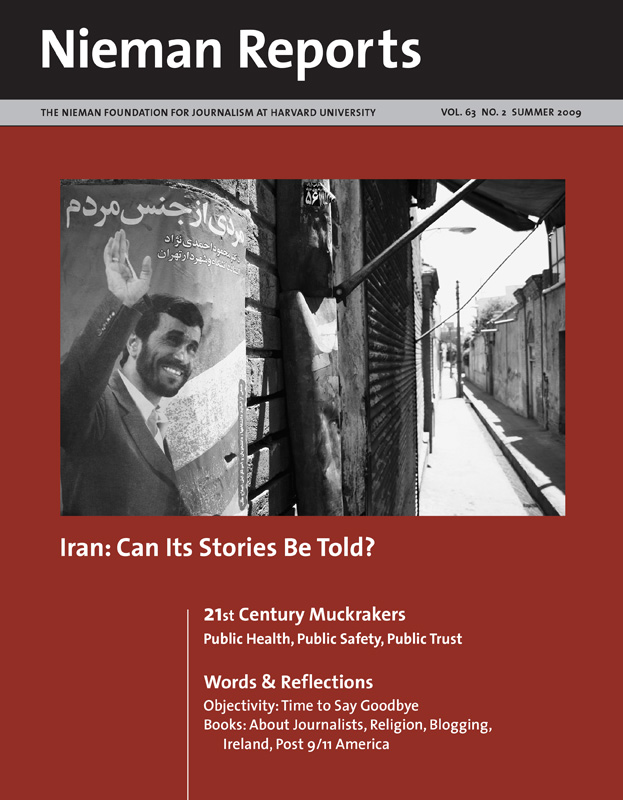EDITOR’S NOTE:
On the Media interviewed Mark Seibel about his Nieman Reports’ article.When Iranians go to the polls in June, McClatchy’s Warren P. Strobel will be there. But we almost didn’t send him. After all, we hadn’t gone to Mumbai for last year’s terrorist attack, nor had we sent anyone to Mexico for the emergence of this year’s flu outbreak. We debated long and hard about whether to send someone with President Obama to the Summit of the Americas before agreeing that we would let The Miami Herald provide coverage for our newspapers—without the expertise of either of McClatchy’s White House correspondents.
We did send Steven Thomma, a McClatchy White House reporter, to Europe to cover Obama’s tour there. He didn’t travel to and from Europe with the White House press corps, however. It was cheaper for him to get there on his own and then begin his reporting with the President in London.
Tired of reading about newspaper economics and what they’ve done to newsgathering? Maybe you should just stop here. There’s no mistaking that the country’s economic malaise—and the news industry’s inability to come up with a surefire way to make money on the Internet—has taken a huge toll on the American news media’s ability to track what goes on in the world. It’s enough to make one long for the good old days when we could lay off reporters and insist with a straight face that there would be no change in our ability to cover the news. No more. The last year of layoffs, cutbacks and consolidations have hurt. Bad.
The broadcast networks have all but shuttered their overseas bureaus. The list of newspapers that have abandoned the international playing field is a long one. Cox, Newsday, The (Baltimore) Sun, and The Boston Globe have eliminated their international news bureaus entirely. The Dallas Morning News has cut back to just coverage of Mexico, as has the Houston Chronicle. The Miami Herald, once the newspaper of Latin America, pretty much now staffs stories only in Cuba and the Caribbean. The Chicago Tribune and the Los Angeles Times are working through a painful consolidation that will cut the total number of Tribune Company correspondents in the field by half; they’ve already made a similar consolidation of their Washington bureaus. The New York Times charges gamely ahead, mortgaging its headquarters, borrowing at usurious rates from someone it should be investigating, refusing to slash its newsroom staff, and chalking up losses in the scores of millions of dollars. Let’s hope there really is a better day ahead.

The Iran news page of McClatchy’s Web site.
Cuts and Compromise
By comparison, maybe the news from McClatchy isn’t so bad. Despite an agonizing series of cuts, we’ve kept our foreign bureaus. We still have operations in China, Israel, Iraq, Egypt, Russia, Kenya, Mexico and Venezuela. We’ve had three reporters in Afghanistan recently for extended stays—our Pentagon correspondent, another member of the national security team, and our Moscow bureau chief. We have a very productive stringer in Pakistan, and Jonathan S. Landay, one of the team that won accolades for debunking the Bush administration’s Iraq WMD myth, will soon spend time there.
But we are not running at full steam in a world that deserves it. We’ve had a South Asia bureau in our budget for the past three years; I’m certain it will never open. The persistent hiring freeze has kept us from filling the Mexico City bureau with a full-time correspondent, even as drug crime explodes. When Hannah Allam took her leave to join the 2009 class of Nieman Fellows, we couldn’t replace her, and Egypt remained vacant. Her Cambridge time ends just as our Baghdad bureau chief, Leila Fadel, rotates home, and she won’t be replaced; we’ll cover Iraq with reporters rotated in from the United States, and Hannah knows that she’ll be spending much of her time there, too. China, too, lies fallow; Tim Johnson has gone off to write a book. We’ll rotate people in for six weeks at a stretch, but a lot of expertise will go missing.
I know, if I worked for the Rocky Mountain News or the Seattle Post-Intelligencer, I’d think this sounded like heaven. At least we’re still doing the work we love. And we’ve gotten creative to stretch our dollars. We’re now exchanging copy with The Christian Science Monitor; McClatchy takes their work from Mexico and India and we give them our stories from South America and Africa. It’s how we covered Mumbai and the flu. The barter system lives.
McClatchy also is dedicated to keeping its Washington and foreign operation; corporate has made that clear. But the economic situation is hardly predictable. When I went away for a few weeks of vacation in February, I was assured that while cutbacks were likely throughout the chain, the Washington bureau wasn’t expected to take a big hit. When I returned, the message was different: We cut expenses by more than 20 percent, everyone took a pay cut, and two people lost their jobs—a big blow in a small bureau.
When the State Department recently asked the news organizations that regularly cover it to agree on a new rotation system to decide who would travel with Hillary Clinton, we puzzled: Was it better to pick the system that would give us the most opportunities to travel or the one that would make it so we wouldn’t have to say “no” as often? The problem with those rotations is that if you decline too often, you’re disinvited. Still, any invitation to travel with the secretary now gets weighed carefully: Is she going to some place we already have someone near? Is she likely to make big news? Are the editors of our local papers likely to care? It’s a pretty high threshold at a time when we are trying to hold onto as many of our diminishing dollars as possible for coverage of America’s shooting wars. This year, we haven’t gone on any trips.
Which brings us back around to Iran. We’ve gotten great stories out of Iran before, and Hannah’s done some wonderful work there, and Warren, too. We even have a section on our Web site devoted to the topic, www.mcclatchydc.com/iran/, and U.S.-Iran relations are in flux. Obama supposedly is trying to reach out, Ahmadinejad could well lose, and the future of the whole nuclear program could be in the balance.
Most important of all, journalist visas have been hard to come by, and Iran is making them available for the election. In the end, that made the decision for us. But not without cost: Our Pentagon correspondents long-planned trip to Afghanistan was cancelled. That’s the sort of balancing act today’s economy forces us to make.
Mark Seibel, a 1992 Nieman Fellow, is managing editor for online news in McClatchy’s Washington, D.C. bureau. In 1984 he joined The Miami Herald as its foreign editor, where for nearly 20 years he directed that newspaper’s extensive international coverage, including the expansion in the reach of its International Edition. He became McClatchy’s editor in charge of international and national security coverage in 2003, a position he held until assuming his current role in 2008. During the Gulf War in 1991 and the March 2003 invasion of Iraq, he was assigned to Knight Ridder’s Washington bureau (then, the parent company of The Miami Herald) to oversee coverage of those stories.


